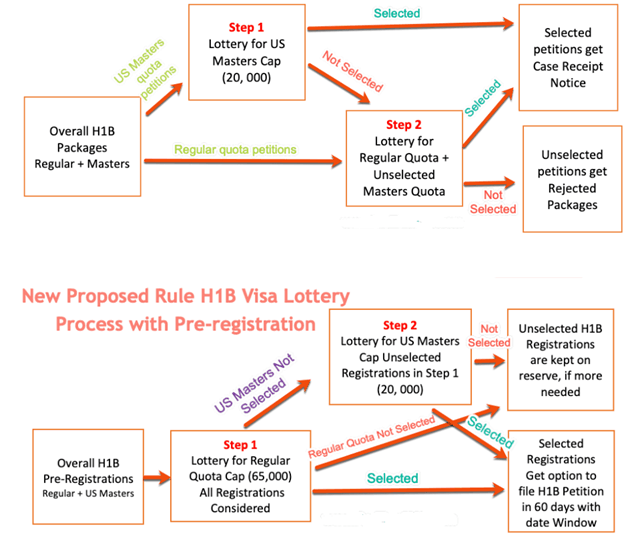What Is The H1B Visa?
The H1B visa is a requirement in the United States under the Immigration and Nationality Act that allows U.S. employers the opportunity to temporarily hire and employ workers from foreign countries in specialty occupations. The H1B visa gives U.S. companies the opportunity to recruit and hire non-US citizens, who have specialized knowledge as well as a bachelor’s degree or equivalent work experience, for skilled workers who are found in foreign countries for positions companies may not otherwise be able to find qualified candidates for. The H1B visa has been a great tool for allowing U.S. companies the opportunity to strengthen their workforce’s knowledge base and skill set.
H1B Visa Rules
In order for a non-U.S. citizen to work for a U.S. company, the employer must sponsor the skilled worker as well as offer a job and petition for the H1B visa with the U.S. Citizenship and Immigration Services. The approved petition becomes a work permit that allows the worker to get a visa stamp and work in the U.S. for that employer.
H1B Visa Requirements
One of the basic requirements for the H1B visa is education. To qualify for the H1B visa the employee must hold a bachelor’s degree or higher or possess equivalent work experience. The employee’s degree must also be from an accredited college or university. If the employee holds a four-year bachelor’s degree from a foreign university the employee will need three years of related work experience in the same or similar field which can be considered equal to one year of additional education allowing the employee the ability to fulfill the four-year degree requirement.
In addition to academic qualifications, the employee must be fully qualified, certified, or accredited to lawfully perform the duties associated with the job position being offered. For example, there are many occupations that require professional credentials or a license. Occupations such as a medical doctor, dentist, attorney, CPA, and RN all require professional credentials to perform their duties in the United States. The employee must obtain any of these credentials, if any of these job roles will be their occupation, before beginning to petition for the H1B visa.
H1B Visa Process
A U.S. employer who chooses and agrees to hire the employee must file for the H1B visa on behalf of the employee. The employee cannot petition for the H1B visa on their own. The employer must file for an H1B petition with the U.S. Citizenship and Immigration Services. Filing H1B Visas is time-sensitive.
The H1B petition itself is a two-step process. The first step is to get labor clearance or certification. The first step requires the U.S. employer to submit several government forms and an application document which must be submitted to the government electronically through a government portal system. The second step is to file the H1B visa petition with the U.S. Citizenship and Immigration Services. There can also be fees associated with the Labor Clearance and the H1B petition. Fees change from time to time.
WHAT DOCUMENTS ARE NEEDED FOR THE H1B APPLICATION?
The U.S. employer may require certain documents from the worker for the purpose of the petition. These are the documents the worker will need for the H1B Visa petition. It is also in the worker’s best interest to be as thorough as possible to locate and include any awards, certifications, letters of recommendation, etc. These supporting documents will help the worker during their H1B petition review and the more supporting documentation that can be supplied the greater the chance of the H1B petition being approved.
The employee documents required for the H1B petition application are:
- Copy of passport
- Copy of degrees and transcripts
- Letter from current employer
- Copy of previous employment or experience
- Copy of any certifications or related achievements
Proposed Pre-registration Rules & Requirements for Next Year
H1B Visa rules and requirements change over. Below you will find an illustration of the current H1B Visa process:

H1B Rules & Regulations Explained:
In the past, the H1B Visa Lottery Process was conducted to meet 20,000 H1Bs and the petitions not selected in that pool were added to a regular quota pool and the lottery was conducted for the entire pool to meet 65,000 H1Bs. Now, with the new proposed rule, USCIS will reverse the order in which they conduct the lottery.
The H1B Lottery Process – With the newest rules, the first lottery is conducted from the entire pool of registrations to meet the regular quota cap of 65,000 and then the lottery is conducted only for U.S. Masters or higher degree applicants to meet the 20,000 cap. They estimate that it will increase the chances of U.S. master’s degree quota applicants by 16 percent, which is approximately 5,340 additional petitions selected for U.S. master’s degree quota candidates. See the illustration below which showcases the lottery process for both the old and new H1B petition process:

The H1B visa process is extensive and very complicated. Not only does it require varying pieces of documentation but there are also several government forms and applications that need to be read, completed, and filed. And that is just the beginning! The filing process also includes being very knowledgeable in the ever-changing world of H1B visa rules and regulations. While the above mentioned and illustrated H1B visa process rule changes are current, the process, rules, and requirements associated with acquiring an H1B visa change often. It is highly recommended that you hire an experienced and successful immigration attorney to help with the H1B visa process.
The Immigration Law Offices of Neelam Bhardwaj PLLC represents corporate and individual immigration clients in complex and routine areas of Employment Based Immigration and Nationality law. Contact Neelam Bhardwaj and her team over at The Immigration Law Offices of Neelam Bhardwaj PLLC. Contact us today for a legal consultation.
